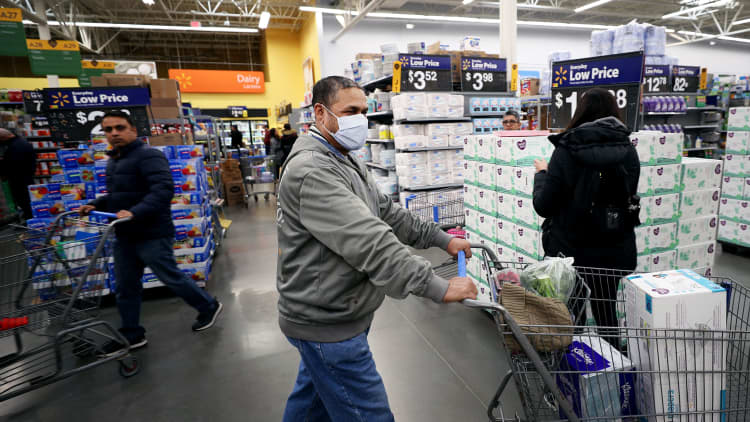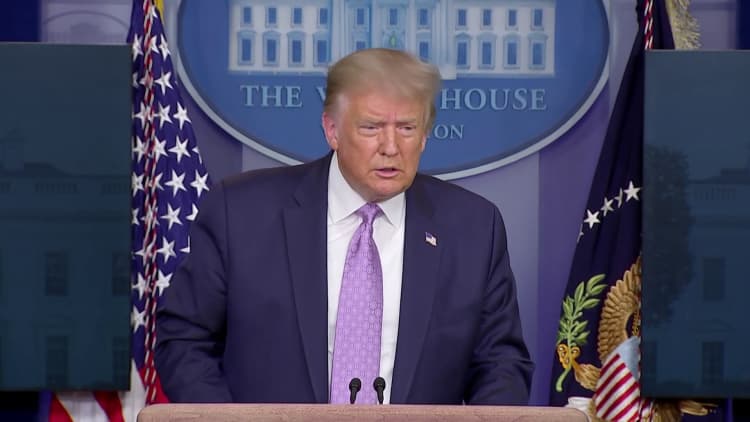The United States has surpassed 5 million Covid-19 cases, a grisly milestone that represents roughly a quarter of all infections across the world confirmed since the coronavirus first emerged from Wuhan, China a little over seven months ago.
It took just six weeks for the number of Covid-19 infections to double in the U.S., which logged the last 1 million infections over the last two weeks, according to data compiled by Johns Hopkins University.
The latest grim record comes as growth in new cases in the U.S. appears to be leveling off at an average of 54,235 new infections a day over the last week, according to a CNBC analysis of Hopkins' data. New cases peaked at 67,902 new cases on July 19, based on a seven-day average, after a resurgence of coronavirus cases ripped through the Sun Belt states in June and July.
California and Florida have both reported more than 500,000 total cases since the outbreak hit the U.S. in late January and Texas is closely approaching that number. Total cases for each state now exceed New York, which was once considered the epicenter of the nation's outbreak earlier this year. However, those states have reported far fewer deaths than the Empire State, which has lost more than 32,000 people to the coronavirus so far, according to Hopkins.
Doctors say they've been able to save more lives compared with the peak in New York in March and April because they know more about the virus and have discovered better treatments, such as remdesivir. The recent surge in cases has also affected far more younger people, who also have higher survival rates.
U.S. health officials fear the virus may be widely circulating in parts of the Midwest now. White House coronavirus advisor Dr. Anthony Fauci and coronavirus task force coordinator Dr. Deborah Birx have voiced concern that states like Ohio, Tennessee, Kentucky and Indiana are beginning to see a tick up in their so-called positivity rates, or the percent of tests that are positive.

"Every country has suffered. We, the United States, has suffered ... as much or worse than anyone," Fauci said during an interview with CNN and the Harvard School of Public Health on Wednesday.
"I mean when you look at the number of infections and the number of deaths, it really is quite concerning," he said.
Fauci has criticized the divisiveness created between public health measures to prevent the spread of the coronavirus and reopening the economy, saying it has become a debate between choosing one or the other.
He has suggested some states take a "serious" reexamination of where they are in the process of reopening and determine whether they need to pause or roll back some reopenings.
"I don't think we need to go into the fall and the winter thinking we're going to have a catastrophe," Fauci said during a Q&A with the Brown University School of Public Health on Friday. "We could go into the fall and the winter coming out of it looking good if we do certain things."
Meanwhile, President Donald Trump has continued to press states to reopen and reiterated his belief that lockdowns would cause more harm than good. He said the nation should now focus on keeping older Americans safe while sending people back to work and school.
"Lockdowns do not prevent infection in the future. They just don't. It comes back many times, it comes back," Trump said at a press briefing Monday.
However, Trump said on Wednesday that there's "no question" the virus will eventually "go away like things go away." The president's comments contradict his medical advisors and the World Health Organization, which have all warned that the virus may never be completely eradicated from the planet. The president also continued to push for schools to reopen this fall, saying that he believes most of them will. When it comes to the coronavirus, he said children are able to "throw it off very easily."



